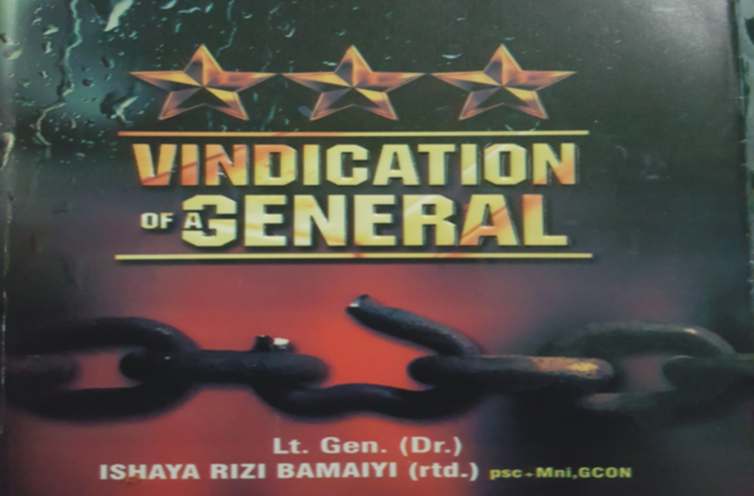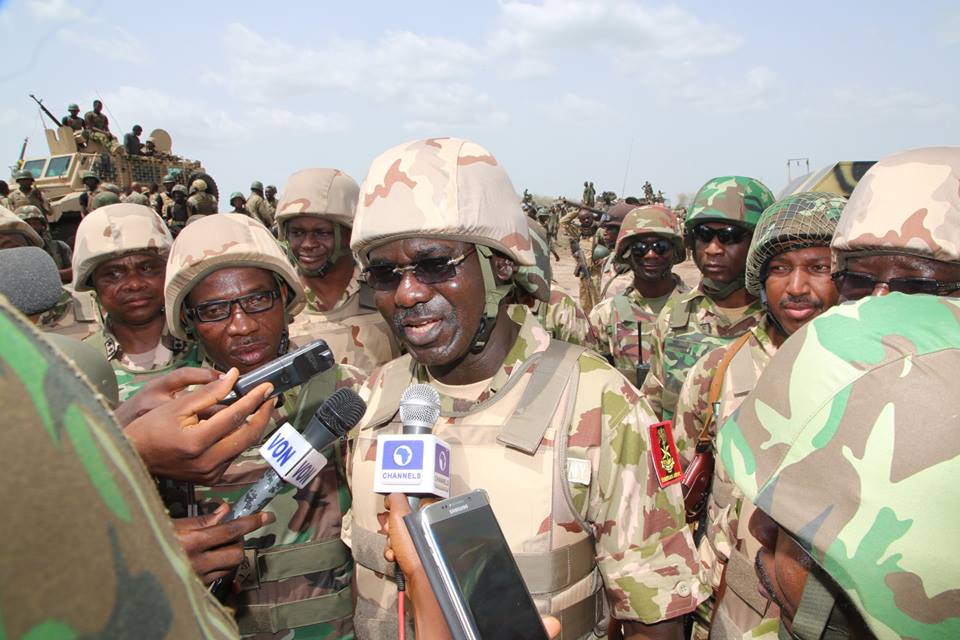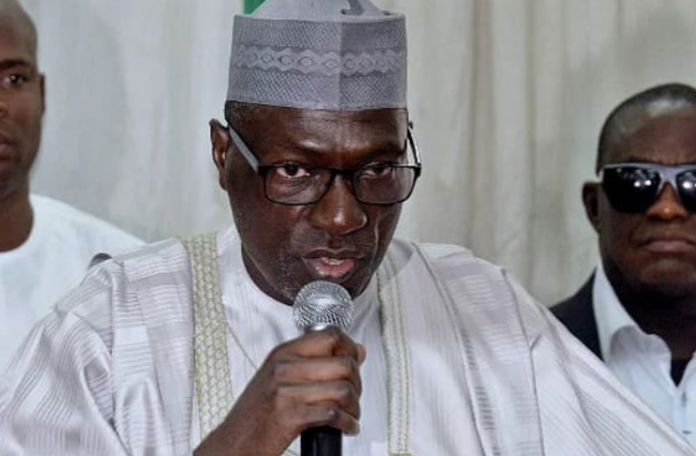BY HAKEEM YUSUF
Biographies have their value, but where they are of individuals who have either held public office or had role governance in their private capacities, biographies tend to generate controversy. People of perception and deep reflection know that autobiographies or memoirs of former public officers are even more susceptible to controversy as they could easily be used for less than altruistic purposes. Revisionism – attempts to change accepted ideas and beliefs in a way that is wrong or dishonest – even of recent history, is one of the typical elements in the arsenal of autobiography. Autobiography is sometimes deployed to white-wash otherwise dishonourable, criminal or even venal actions of the author while in public office. Self-righteousness, indignation and even vilification of others, are other features informed readers identify in this genre of writing.
The book, Vindication of a General by retired Lt. General Ishaya Bamaiyi, a former Chief of Army Staff under the late General Sani Abacha is a classic example of just how auto-biographies can be used as a dangerous instrument for white-washing a sordid past. In the foreword to the book, General Yakubu Gowon stated that General Bamaiyi’s account in the book is ‘commendable’ and written with ‘candour’, ‘a rare spirit of forthrightness…laying bare the truth’ (p. ix); and that it was written ‘neither to gain satisfaction or seek vengeance against his traducers because he was vindicated by the courts of the land’ (p.ix). With due respect to General Gowon, I disagree. The book is a classic exercise in self-righteousness and revisionism of recent Nigerian history.
I write this rejoinder for two reasons: first is to take up the invitation of General Gowon ‘to those who have or hold contrary views or opinion to offer their own narrative devoid of unnecessary tirade or vituperations’ (p. x). The other is because I am involved directly as a participant in the trial of General Bamaiyi and I am concerned about the need to ensure the records are kept straight for posterity.
The main thrust of General Bamaiyi’s narrative is that he is an apolitical, democracy-loving army General. As a result of his commitment to democracy and his opposition to the emergence of Chief Olusegun Obasanjo, an ex-military Head of State as president in 1999, trumped-up charges were brought against him to keep him out of circulation. Suffice it to say that there have been a number of denouncements of the distortions in various parts of the book, particularly from his military colleagues.
Advertisement
A major issue in the book for instance is the alleged coup of 1995. I do not have direct knowledge of the details of the alleged coup. There is however public consensus on the view that the 1995 coup was a phantom coup created by the late General Abacha’s minions. Immediate victims of that ‘coup’ ranging from Chief Olusegun Obasanjo, Colonel Gabriel Ajayi, to Navy Commander Dennis Omessa, and others have, over the years – and most recently in reaction to General Bamaiyi’s book – described it as the ‘phantom coup’. The information that has been in the public arena distinctly supports the view that the 1995 ‘coup’ was a phantom one orchestrated as part of the famed game of musical chairs that Nigeria’s military played for almost three decades from 1966-1999.
Setting the Records Straight- General Bamaiyi’s Persecution Claims Do Not Add-Up
In any event, my main interest in the book is General Bamaiyi’s trial for conspiracy to commit murder of the now late Alex Ibru. As I stated earlier, I was an active participant in that trial. In light of the nature of the allegations made by General Bamaiyi, silence is not golden in this instance. Specifically, the General alleged that the trial judge in the case, Justice Ade Alabi as well as then Attorney General of Lagos State, Professor Yemi Osinbajo (SAN, and current Vice-President) who led the prosecution team ‘was said to have been invited to Abuja’ where they were ‘briefed on how to handle the case…They were alleged to have been given six months to complete the case and convict me at any cost’ (p.133, p.145).
We are not told who invited Justice Alabi and Professor Osinbajo. We are also not told what the incentive is for a very senior Lagos State Judge and the Attorney General of the State who’s Governor, Senator Bola Ahmed Tinubu (then of the AD, later ACN) was the de facto leader of political opposition to the PDP Federal Government under the leadership of President Obasanjo. Nigerians still remember that there was hardly any love lost between the Obasanjo Presidency and the Lagos State Government. The withholding of local government allocations leading to litigation between Lagos and the federal government as well as the many other legal and political face-offs between the two arms of government in various other cases between 2000 and 2007 are all part of the country’s recent history. The point then is why would then Governor Tinubu, his Attorney General, the ‘DPP’ and the Lagos State Judiciary conspire with President Obasanjo and the PDP to punish him as General Bamaiyi would want us to believe? It does not add up.
Advertisement
General Bamaiyi further claimed that he could not understand why the ‘DPP’, Lagos State was adamant to see his trial through. He did not state who or what the ‘DPP’ is. It is important to clarify this point as the ‘DPP’ is used to refer to both a department and the head of that department in all the ministries of justice in the country (including that of the Federal Ministry of Justice). As a department, it is the ‘Directorate of Public Prosecutions’ and the head of the department is the ‘Director of Public Prosecutions’, which is the second way it is used. Both uses are common. It is relevant that General Bamaiyi be clear on this seemingly insignificant point because it is actually important in the context. First, I was a Law Officer in the Directorate of Public Prosecutions and a member of the team that prosecuted General Bamaiyi from 2000 to 2005. So, was he referring to that team? Second, at least four different Directors of Public Prosecutions were involved in his trial over the period. They succeeded each other for reasons varying from death, judicial appointment, to inter and intra-departmental transfers. Is he referring to any of them in particular or all? If the latter, it is interesting that he did not offer a guess as to why these officers were doing the obvious; namely, doing their jobs as they were expected to.
One of the main claims he makes in the book is that Colonel Jubril Yakubu (former military administrator of Zamfara State) and Captain Najaja were forced under duress to implicate him and this was the basis for his subsequent arrest (p.129). Interestingly enough, that claim was repeated at the trial by Colonel Yakubu who was charged along with him before Justice Ade Alabi in the Lagos High Court. The prosecution countered the claim and Justice Alabi ordered a ‘trial-within-trial’, which is the process for verifying whether the claim was true or not. During that trial, the prosecution applied to tender the video of the conditions under which the said statement was taken, but the accused persons objected to this. Unfortunately, their objection was upheld by the court. That is a matter of regret for that if that video was shown, it would have put a LIE to the claim of duress and posterity would have been saved from the many concocted tales in the The Vindication of a General. The question is why did the accused persons refuse to let the court and the world see the video recorded when they were making the same statements they claimed was obtained from them under duress and torture? That surely would have been vital, if not decisive evidence in their favour if they were indeed tortured into making the statements. That tape hopefully still exists and it would really help if General Bamaiyi as well as Colonel Jubril Yakubu (and indeed, the other accused persons) would demand the tape be made public. That would help all involved to come clean and remove the wool that is being sought to be pulled over Nigerians’ eyes on the matter.
Whether out of lack of knowledge of the law or outright mischief, to further the story of persecution, General Bamaiyi stated on page 144 of his book that when he, along with his co-accused persons were brought to Lagos from Abuja, a Lagos State ‘female magistrate judge directed’ they be detained to Kirikiri Maximum Prison after they had been arraigned before her. He then asserted that she did this because ‘the judge was instructed to assume jurisdiction she did not have’. We are again not told who ‘instructed’ the Magistrate, where, when and how.
To be sure however, Magistrate Courts do have the jurisdiction to do exactly what the Magistrate did in his case; they had done so for decades before this and continue to do so till date. It is called ‘Remand Proceedings’ and hundreds, if not thousands of cases before and after that case are handled like that to secure a court’s order following investigations into very serious offences. This is to ensure the defendant does not abscond or interfere with the evidence before the Director of Public Prosecutions review the case file to issue legal advice on whether or what offence appears to have been committed. In other words, to enable the DPP determine whether the facts disclose a prima facie case against the alleged offender. This was exactly what happened in his case. After the review, the Lagos State Ministry of Justice determined a prima facie case was established against the accused and he, along with others, was charged with the offences in the High Court. That was and remains the procedure. It is incredulous that General Bamaiyi is not aware of this procedure with the resources at his disposal.
A critical issue about the trials is the delay in concluding it. Usefully, General Bamaiyi confirmed exactly what was responsible for it on page 145 of his book: ‘We collectively made plans to ensure that the case was not concluded within the time planned by our persecutors’. So, it is clear that he along with his co-accused persons deliberately wanted to frustrate the trials on the unproven claim that they were being persecuted. Yet, he went on to complain that the trial Judge saw through their antics!
Advertisement
There is the more serious claim that Justice Ade Alabi demanded a bribe through an intermediary from the accused persons in the course of their trial. What is intriguing about this is how it does not square up with the claim that Justice Alabi was already acting under instructions to convict them. He conveniently forgot to add that his lawyer, Mike Okoye who initially helped to publicise the claim later admitted there was no basis for it and following a contempt proceedings against him (Okoye) led by the late legal icon, Chief FRA Williams, he apologised in national newspapers for the false claim on the orders of the court which had every reason to jail him for bringing the criminal justice system, the bar and the bench, into disrepute.
Interestingly too, he claimed that following their petition against Justice Ade Alabi, the latter was ‘docked’ by the National Judicial Council (NJC). This is a very strange claim indeed. General Bamaiyi by his admission was annoyed with the NJC panel in question. This was because the panel did not find any wrong-doing on the part of Hon. Justice Ade Alabi after it investigated the matter. The NJC Panel had eminent Nigerians of impeccable reputation as members; Hon. Justice B.O Babalakin, Ambassador M.L. Sambo and T.I. Onomigbo-Okpoko (SAN, a former President of the Nigerian Bar Association). General Bamaiyi is sore that the report of the panel said Justice Alabi was not ‘docked’. He stated rightly that ‘the panel report stated our evidences (sic) were full of lies’ (p.147). It is thus not strange that he does not understand that the NJC investigation panel does not, and could not have ‘docked’ any one since it is an investigation panel. Only courts and tribunals ‘dock’ people.
General Bamaiyi is similarly displeased that the Press was barred from the proceedings of the investigation panel. This again demonstrates a lack of knowledge or understanding of the processes of the NJC or, is deliberate, plain mischief. It is relevant to point that before and after that investigation, no such NJC Panel investigation had been covered by the Press. The NJC simply does not allow it and there has been no precedent for it. It is particularly strange that a General in the Nigerian Army who rose to become Chief of Army Staff would complain about the Press not being allowed into the NJC investigation when the Army has never allowed the Press into investigations of its rank and file, say for coup plotting for instance. In any event, it is the case that investigations are not normally covered by the Press.
In order to ensure their plan of delaying the trial is actualised, General Bamaiyi and his co-accused persons employed every strategy conceivable, from spurious allegations against the trial judge for bias, to filing all sorts of applications and appealing interlocutory judgments against them all the way to the Supreme Court and back. The abuse of process they perpetrated was unprecedented in any criminal proceedings in Nigeria. The Supreme Court, on more than one occasion ordered him and his co-accused to go and face their trials in the Lagos High Court but they resisted for years. It is thus condemnable that he would turn around as he did on page 153 of his book to assert that his trial ‘was a caricature of the system of justice in our country’. It is clear General Bamaiyi and his co-accused persons contrived and created the caricature. The experience with them was one of the motivations for the reform of the Criminal Procedure Laws of Lagos State through the passage of the Administration of Criminal Justice Law of Lagos State 2011 which came to serve as the model for the Administration of Criminal Justice Act 2015. Both are designed to check the sort of abuses General Bamaiyi and his colleagues subjected the criminal justice process to during their trial.
Advertisement
The Rosulu and Ajudua Angle- A Story Untold
General Bamaiyi’s account is also surprising in what it chooses to omit. This is with reference to the fact that he reported to the Economic and Financial Crimes Commission (EFCC) that he had been duped of the sum of $8.4 million by Fred Ajudua who promised to help him secure his freedom. It is useful to refresh our memories with the proceedings of the case brought by EFCC following his complaint against Oluronke Rosulu (the Registrar of the Court where he was then being tried) and Fred Ajudua. At the trial of Rosulu who was jailed for fraud by a Lagos State High Court in 2005, General Bamaiyi stated in court that:
‘On November 23, 1999, I was in cell 5 (first floor) at Kirikiri maximum prison. Later Ajudua and Ade Bendel were brought into the block. I and Ajudua (sic) were together in my cell, so we became friends. Ajudua told me that he is a lawyer and had studied my case, and found out it was purely political. Ajudua told me that he was interested in the case and had sent his wife to see the Lagos Chief Judge, Justice Ade Alabi (retired) and the state Attorney General, Professor Yemi Osinbajo, over the matter. I was told that the Chief Judge was the one in contact with Chief Babalola…I was told that Chief Babalola charged $18million as professional fees and that the money was to be paid through Justice Oyewole. Ajudua told me that Justice Oyewole was going to send his registrar (Oluronke)
Chief Afe Babalola (SAN) denied any role in the scam. While Ajudua is still being tried, Rosulu is serving the ten year jail term for her role in the scam. The question is where did the General get the money he gave to Ajudua with the aim of bribing the second trial judge (Justice Oyewole) and the same Attorney General, Professor Yemi Osinbajo (SAN) he alleged had been instructed to persecute him? It is instructive that this story is omitted from his autobiography. Why is this important story omitted in his book? Is it because he is afraid the EFCC could come after him since all his earnings throughout his military career, even if unspent, could not amount to that sum? I do suggest it is necessary that the questions on this issue be raised. After all, the law is clear that a person who offers to pay a bribe is guilty of a criminal offence. We do have a confession of such wrong-doing by the ‘democracy-loving’ General. In any event, the attempt to secure his freedom through corruption and bribery completely goes against the claims he made in his book on the trial. Since he believed in his innocence, why try to bribe his way out? It puts to question the claim that he rather than the other honourable Nigerians he tried to cast a slur on has all the skeletons in his cupboard.
Advertisement
Yusuf is a reader in Global Legal Studies, Birmingham Law School, University of Birmingham, United Kingdom
Advertisement
Views expressed by contributors are strictly personal and not of TheCable.






